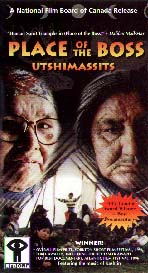|
________________
CM . . . .
Volume VI Number 2 . . . . September 17, 1999
In the mid-sixties, the Mushaua Innu, one of the last hunter-gatherer peoples of North America,
were forced to abandon their 6,000-year nomadic culture and settle in the village of Davis Inlet on
the coast of Northern Labrador - a place the Innu named Utshimassits - Place of the Boss. There,
their traditional hunting and gathering life-style was replaced with the monetary economy of the
rest of Canada. Unfortunately, there were no jobs to be had in Davis Inlet. With their culture
unraveling and the voices of the spirit shaman shouted down by the local Catholic missionaries,
the people of Davis Inlet turned to alcohol and lives full of abuse. A tragic house fire on Feb. 14,
1992, in which six young unattended children died, caused some of the people of Davis Inlet to
reexamine their lives and stop the drinking. But, for the younger generation, nothing has changed.
Their lives revolve around alcohol, drugs and sniffing gas. Suicide is a common occurrence.
Recommended With Reservations.
Katie Cook is a social studies teacher and a teacher-librarian at the Steinbach Regional Secondary School in Steinbach, MB.
To comment on this title or this review, send mail to cm@umanitoba.ca.
Copyright © the Manitoba Library Association.
Reproduction for personal use is permitted only if this copyright notice
is maintained. Any other reproduction is prohibited without
permission.
Published by
TABLE OF CONTENTS FOR THIS ISSUE - September 17,
1999.
AUTHORS |
TITLES |
MEDIA REVIEWS |
PROFILES |
BACK ISSUES |
SEARCH |
CMARCHIVE |
HOME
|
